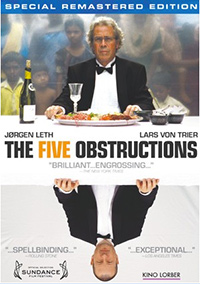 Now over a decade since its 2003 release, Kino Lorber is releasing the Lars Von Trier and Jorgen Leth experiment/documentary The Five Obstructions in a Special Remastered Edition. While this serves as an excellent opportunity for those unfamiliar with the title to take a gander, the timing serves as more of an interesting conversation piece in regards to Von Trier’s release of the final chapter in his Depression trilogy (or quadrilogy, if you will).
Now over a decade since its 2003 release, Kino Lorber is releasing the Lars Von Trier and Jorgen Leth experiment/documentary The Five Obstructions in a Special Remastered Edition. While this serves as an excellent opportunity for those unfamiliar with the title to take a gander, the timing serves as more of an interesting conversation piece in regards to Von Trier’s release of the final chapter in his Depression trilogy (or quadrilogy, if you will).
Around the same time that Von Trier’s masterpiece Dogville was provoking audiences, he unleashed this exciting exercise in filmmaking that’s as engaging as it is thoroughly entertaining. As much as it is an examination of filmmaking, it’s also a rather brilliant motivation to goad one friend into creative action, for, as we move along through the film, one can assume that Von Trier and Leth both seem to struggle with issues of depression, though their techniques and styles are hardly comparable. A mentor, idol, and friend to Von Trier, filmmaker Jorgen Leth agrees to remake his 1967 short film, The Perfect Human five separate times, each with a different constraint on the creative parameters as determined by Von Trier. The results are nothing short of fascinating, and it conveys a creative process that is inspiring and compelling.
Disc Review
For a Special Remastered Edition, one would have liked to see The Five Obstructions get a Blu-ray treatment, but at least this gets the title back in print. Nearly bereft of extra features, there is the inclusion of Leth’s 1967 short film as bonus feature, though, if you visit this after watching the documentary, you will realize you’ve seen nearly all of it spliced up into segments already. However, as Von Trier deems this to be the perfect film, it’s certainly something worth watching on its very own.
Final Thoughts
What seems most readily apparent from witnessing Leth squirm to meet the demands of the gleeful sadist Von Trier is that the human penchant for creativity tends to flourish under pressure and constraint, with challenges that result in creative growth and often garnish a surprising result. As we move through the obstructions, the first is the rather harsh demand that Leth re-make the film in Cuba and with not a single edit longer than 12 frames. The result will be “a spastic film,” cites the bemused Leth, who nevertheless churns out an arresting film, finding creative loopholes around the rule. Next, in an effort to break Leth’s formal distance from his subjects, Von Trier challenges him to film in “a miserable” place, which ends up being shot amongst the masses in Bombay, with Leth starring as the perfect human. Von Trier is unsatisfied with the result, and as punishment, leaves no guidelines for Leth as the third obstruction. In other words, he has complete creative license, which results in the most sonorous and palpably pretentious result, utilizing actor Patrick Bauchau from Eric Rohmer’s 1967 La Collectionneuse. And so it seems that, given complete and utter free reign, the creative mind can sometimes work against itself and deliver less than satisfactory results.
Throughout the process, Leth continues, however, to trump Von Trier’s wish to make a “bad” film leading to Von Trier’s curveball for the fourth obstruction, requiring the exercise be in cartoon format. Leth balks at the thought, citing a hatred for cartoons. After much bitching, the final result happens to be the most arresting of the whole film. Lastly, Von Trier’s final obstruction is to remove Leth completely, remake the film himself and retain Leth’s name as director. Oh, and he’s only splicing footage together that they’ve already filmed over the course of their deliberations, asking Leth to read a letter Von Trier himself composed. It’s a rather hokey note to end on, yet one can’t deny that it’s an arresting exercise, not only as a worthwhile nod to Leth but as an odd glimpse of provocateur Von Trier.
Film: ★★★★/☆☆☆☆☆
Disc: ★★★/☆☆☆☆☆


